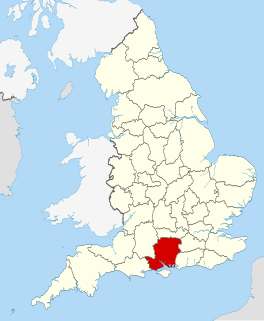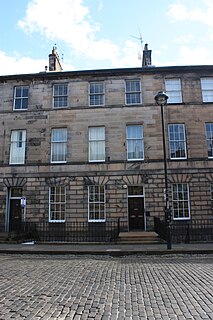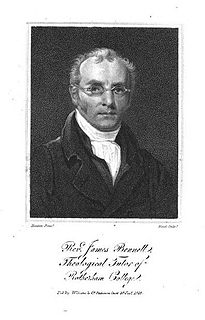Life
Barker was born in London on 30 November 1799, and was entered at Christ's Hospital in 1807, where he remained until age 16. He wished to proceed to Cambridge to for classical studies, with a view to taking holy orders; his parents, however, who were strict nonconformists, refused to agree. In time he decided to entering Homerton Old College and prepare himself for the congregational ministry, in 1821. He married the same or the following year, thereby cutting short his college course.

Christ's Hospital is a coeducational independent day and boarding school in Horsham, West Sussex, England.
In 1822 he became pastor of a village church at Alresford, Hampshire, and two years later he moved to Harpenden, where he spent nine years as minister and teacher. In 1833 he moved to Uxbridge, and in 1838 was appointed (at the recommendation of John Pye-Smith) the tutor in classics and Hebrew at Spring Hill College, Birmingham. Here in the following year he was joined by Henry Rogers. Barker was provided with quarters in the college, and was responsible for the maintenance of its discipline.

Old Alresford is a village and civil parish in Hampshire, England. It is 1 km north of the town of New Alresford, 12 km north-east of the city of Winchester, and 20 km south-west of the town of Alton.

Hampshire is a county on the southern coast of England. The county town, with city status, is Winchester, a frequent seat of the Royal Court before any fixed capital, in late Anglo-Saxon England. After the metropolitan counties and Greater London, Hampshire is the most populous ceremonial county in the United Kingdom. Its two largest settlements, Southampton and Portsmouth, are administered separately as unitary authorities and the rest of the area forms the administrative county, which is governed by Hampshire County Council.

Harpenden is a town in the St Albans City district in the county of Hertfordshire, England. The town's population is just over 30,000. Harpenden is a commuter town, with a direct rail connection through Central London and property prices well over double the national average. Geographically it is located between two much larger neighbours: Luton town and the city of St Albans. It is flanked by the villages of Redbourn and Wheathampstead.
On 22 November 1870 he found himself too weak to rise, and spent the day in bed. In the evening, shortly before nine o'clock, he fell asleep, and though he woke again after a few minutes, he had already lost the power of speech, and died the next morning. He was buried on the 29th in the Birmingham general cemetery.






